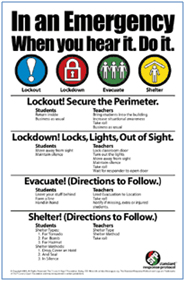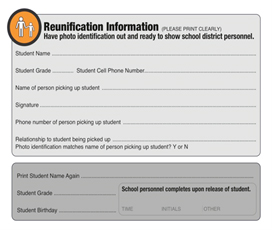The Role of Law Enforcement in Responding To School-Based Incidents: Guidance from The “I Love U Guys” Foundation

As the role of law enforcement in schools continues to be questioned, the U.S. Department of Justice, Office of Community Oriented Policing Services (COPS Office) believes that the core tenants of community policing—problem solving, organizational transformation, and partnerships—can play an essential role in keeping our children safer in our nation’s schools and communities. The COPS Office strongly supports the National Association of School Resource Officers’ triad model (educator, mentor, and law enforcement) and believes that the role of police in our nation’s schools should be to serve as both a source of security as well as a gateway for identifying children in need and connecting them with necessary support services. To that end, the COPS Office seeks to advance community policing throughout the nation by promoting innovative and effective programs that support law enforcement and the communities in which they serve. One such example is The “I Love U Guys” Foundation, which was borne out of tragic circumstances and is dedicated to providing educational programs and positive actions in collaboration with families, schools, communities, organizations, and government entities.
On September 27, 2006, a gunman entered Platte Canyon High School in Bailey, Colorado, and held seven girls hostage, one of whom was Emily Keyes who was ultimately shot and killed. During the time she was held hostage, Emily sent her parents, Ellen and John-Michael Keyes, the following text messages: “I love you guys” and “I love u guys. k?” From the inception of The “I Love U Guys” Foundation, the Keyes family explored the arena of school safety through symposiums, focus groups, research, and the dedication of a strong, diverse board of directors. As a result of their dedication, passion, and commitment, they have been able to create, package, promote, and institute programs and initiatives advancing student safety throughout the nation. They have developed two simple, but profound resources to help schools and their first-responder partners during a school-based emergency or incident: Standard Response Protocol (SRP) and Standard Reunification Method (SRM).
After extensive research, The “I Love U Guys” Foundation developed the SRP, a simple yet effective, all hazard approach that can be implemented during any crisis, including weather events, fires, accidents, intruders, and other threats to student safety. The premise is straightforward—there are four specific actions that can be performed during an incident:

- Lockout! Secure the Perimeter – This protocol is used to safeguard students and staff within the building from a threat or hazard outside of the school building (i.e., violence or criminal activity in the immediate neighborhood, dangerous animal in playground, civil disobedience).
- Lockdown! Locks, Lights, Out of Sight – This protocol is used to secure individual rooms and keep students quiet and in place when there is a threat or hazard inside the school building (i.e., parental custody disputes, intruders, active shooter).
- Evacuate! This is always followed by a location and is used to move students and staff from one location to a different location in or out of the building in an orderly fashion (i.e., fire).
- Shelter! This is always followed by a type and a method of shelter needed and is the protocol for group and self-protection (i.e., tornado, bomb, flood, hazmat). The SRP is not a replacement for a school safety plan or program, but can be incorporated as an effective classroom response to incidents. By developing a simple, shared vocabulary between students, staff, law enforcement, and other first responders, the SRP provides a continuity of expectations and actions for all stakeholders involved in a school-based incident and enables rapid response determination when an unforeseen event occurs. Bringing the SRP into schools is one way in which law enforcement can enhance their partnership with educators and administrators to develop comprehensive, community-oriented strategies to address the range of real and perceived threats to school safety.
One critical aspect of crisis response is accountable reunification of students with their parents or guardians in the event of a school crisis or emergency. The Standard Reunification Method (SRM) provides law enforcement and school safety teams with proven methods for planning, practicing, and achieving a successful reunification. Site-specific considerations will impact how these practices can be integrated into school and district safety plans and will require partnerships with all responding agencies participating in a crisis response. The SRM addresses the mental demands that accompany any crisis, maintains the chain of custody for every student, and helps to diffuse the emotion building at the scene of an incident.

The core concept of the SRM rests on accountability, achieved through a process based on managing the physical location of students, staff, and of incoming parents. It is based on the “Incident Command System,” a response method that determines the role of everyone responding to a crisis and defines a shared vocabulary and shared expectations of behavior. The process also uses perforated cards that are completed by the parents or guardians at the reunification site. A predetermined, practiced reunification method ensures the reunification process will not further complicate what is probably already a chaotic, anxiety-filled scene. By having a defined process with signage, cards, branding, procedures, and protocols, the SRM presents an organized, calm process for all involved. By adopting, communicating, and practicing the SRM, better decisions occur, leading to successful reunifications.
Through an interagency model that incorporates the SRP and SRM, all necessary stakeholders will become familiar with the SRP and SRM terms of art and directives and will incorporate these models in their official written response plans so that all responses are coordinated. Agencies can also participate in free training provided by The “I Love U Guys Foundation.” The “I Love U Guys” Foundation also provides downloadable SRP materials (includes MOUs, SRP guidelines, a customizable training presentation and workbook, signage templates, red/green/yellow/medical cards, classroom posters) and SRM materials (i.e., sample district and school plans, reunification cards) on their website free of charge for any agency interested in implementing the protocol.
Collaboration between law enforcement and school systems is essential to protect students and staff from disruptive forces while nurturing safe learning environments. The resources provided by The “I Love U Guys” Foundation are examples of simple tools and resources that multidisciplinary teams can use for training aids to develop and implement procedures when responding to a crisis event. For more information: The “I Love U Guys” Foundation, PO Box 1230, Bailey, CO 80421, 303.426.3100, www.iluvuguys.org.
-John-Michael Keyes,
Founder
“I Love U Guys” Foundation
-Cynthia E. Pappas,
Senior Social Science Analyst
COPS Office
One on One with…Captain Garret Tom, SFPD | The Role of LE in Responding to School-Based Incidents | A Priceless Public-Private Partnership | When Police Engage Immigrant Communities | Dismounting Due to the Economy | Did you know…?

